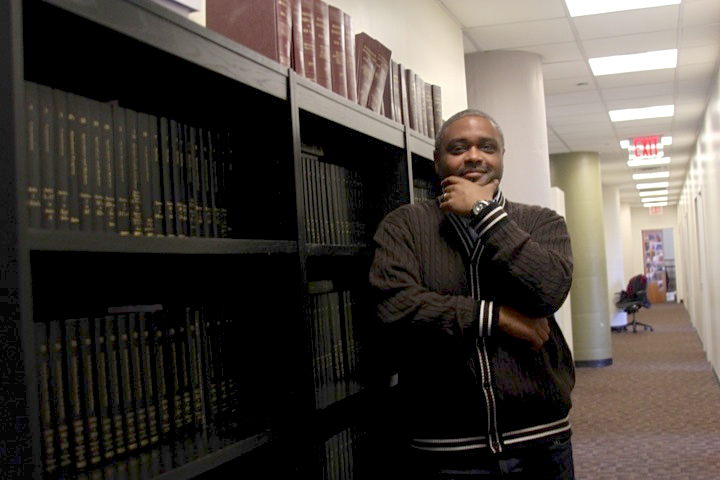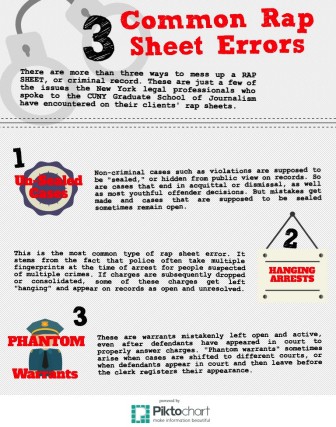
Briana Duggan
Legal Action Center paralegal Frank Murphy had devoted himself to the tedious, painstaking task of correcting rap-sheet errors.
It is hard enough for those sent to jail to fix their own mistakes. But the road to rebuilding a life becomes sharply steeper when saddled with someone else’s as well. And nearly half of those released from New York City’s vast jail complex at Rikers Island have multiple inaccuracies on their official criminal history records.
That staggeringly large rate of slip-ups is what Frank Murphy has encountered since he first made it his business to try and correct those errors before they spoil the chances of young men and women to land jobs or get into school. Murphy, 43, has been scrutinizing records of arrest and prosecution—rap sheets as they’re known throughout the justice system—of those exiting Rikers since 2007. During that time Murphy, a paralegal for the nonprofit organization Legal Action Center, has met with 1,573 Rikers inmates. All are eager to put their past behind them and tackle a new future. But almost half of the records he has seen—778 to be exact—have contained some kind of error: an open arrest for a felony or misdemeanor that should have been voided, a warrant mistakenly issued, or a low-level violation or a juvenile case that should have been sealed. And not just one mistake, either. Murphy calculates an average of 2.2 errors on those that have inaccuracies.
“To err is human,” says Murphy. “I understand that people make mistakes. However, when the system places the burden of correction on the individual, that’s where the frustration begins.”

A six-part series
His task begins with weekly trips across the long narrow bridge connecting the mainland to Rikers where he meets with a half dozen soon-to-be released inmates, three women and three men. There is a self-selection process involved. Inmates must say they want the help, and have at least several weeks more of their sentences left to serve. Those accepted sign a form giving Murphy the right to legally advocate on their behalf. He then files an order with the state’s Division of Criminal Justice Services for copies of their criminal history records, along with a request that the usual $60.75 fee for the documents be waived on the basis that his clients are indigent. When the files arrive, he pores over them, looking for holes: a missing disposition, a low-level violation that should have been sealed. There’s a science to it, says Murphy.
“We connect the dots,” he says. “There will be a disconnect somewhere.” Three or four out of every 10 rap sheets he sees are lacking dispositions for criminal cases. He goes after those first. “To an employer, an open disposition can be worse than a felony with time served.”
Mistakes are entered into an official “Inmate Challenge Form” that is sent on to the state’s criminal justice office. But there’s a hitch: Certificates of disposition showing that a case listed as “open” has, in fact, already been adjudicated must accompany the form. And collecting the certificates, which often cost $10 apiece, can be costly and time-consuming.
Because his clients are incarcerated and can’t work on this part themselves, Murphy’s solution is to trek to the offices of the criminal court clerk in each county himself. If the problem lies with the records of the Office of Court Administration, which oversees the criminal courts, it can be instantly fixed with the tap of a few computer keys. Sometimes that means waiting on long lines. If he’s lucky, a sympathetic clerk invites him behind the counter to search for a group of missing dispositions or unsealed records at the same time. Some clerks clearly understand why Murphy’s mission is so important.
“You’d be surprised how some of these open cases hinder people from moving forward,” one clerk commented recently as she hunted through her computer monitor for cases involving Murphy’s clients as he waited patiently.
By necessity, he measures success in small steps. Leaving the courthouse having remedied errors on just two rap sheets, he’s still pleased with his progress. “That’s two fewer people who have to worry about not getting a job,” he says.
This story is part of a series by
a class on urban investigative reporting at
the City University of New York Graduate School of Journalism
taught by Errol Louis and Tom Robbins,
who served as editors.
* * * *








